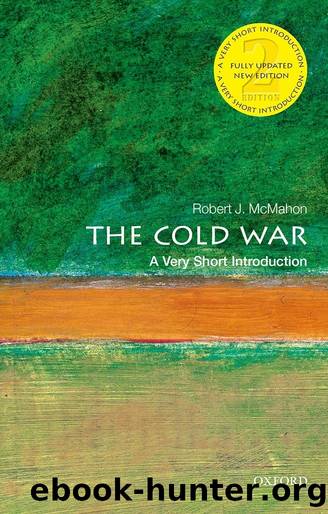The Cold War by Robert J. McMahon

Author:Robert J. McMahon [McMahon, Robert J.]
Language: eng
Format: epub
ISBN: 9780192603272
Publisher: OUP Oxford
Published: 2020-12-11T00:00:00+00:00
Behind Khrushchevâs belligerent challenge to the West lay a ticking time bomb for the Soviet bloc: the alarming rate of East German defections. Between 1949 and mid-1961, approximately 2.7 million East Germans fled to the Westâequivalent to the entire population of the Republic of Irelandâmost of them utilizing the Berlin escape hatch. That embarrassing problem gravely undermined the viability of Moscowâs East German client state and its hardline leader, Walter Ulbricht. As the defections daily grew more numerous through the midsummer of 1961, the East Germans suddenly began to construct a barbed wire barrier to separate the Soviet sector of the former German capital from the Western sectors. The temporary barrier of 13 August soon became a permanent wall, replete with armed guards, an ugly and ominous symbol of Europeâs division into Western and communist blocs. War was averted, to be sure, and Khrushchev was able to provide a form of life-support to the German Democratic Republic, but those achievements came at a high political and propaganda cost for the Soviet Union and East Germany. âItâs not a very nice solutionâ, mused a pragmatic Kennedy, âbut a wall is a hell of a lot better than a war.â Fortunately for the American president, he never had to confront the fundamental question of whether Berlin was worth a war that would almost certainly have claimed tens of millions of lives.
Other international flashpoints also competed for the attention of policy-makers in Moscow and Washington during this crisis-filled period, many emanating from the ever-turbulent Third World. Although the end of empire in Africa proceeded relatively smoothly, with sixteen nations acquiring independence in 1960 alone, the messy denouement of Belgian rule in the Congo that year generated yet another full-blown superpower confrontation. When the Soviets dispatched military equipment and technicians to support the fledgling regime of Patrice Lumumba, the Americans dispatched an assassination team in an unsuccessful attempt to dispose of the embattled Lumumba, an ardent nationalist whom they wrongly tagged as a wild-eyed radical and Russian stalking horse. In 1961, pro-American Congolese forces murdered Lumumba, accomplishing what the CIA itself had failed to do; at the same time, Joseph Mobuto, Americaâs favoured candidate, emerged as the dominant figure in a new Congo government. The United States thus managed temporarily to thwart Soviet ambitions in central Africa, if at the cost of imposing Cold War geopolitics on an impoverished, strife-torn former colony.
During the late 1950s and early 1960s, Indo-China also flared once more into a major hot spot. In South Vietnam, the American-backed regime of Ngo Dinh Diem was combating a broad-based insurgency directed by the National Liberation Front that, under the direction of communist North Vietnam, threatened its survival. In 1961â2, Kennedy significantly increased US military assistance to Diem, dispatching well over 10,000 US advisers in an effort to help crush the so-called âViet Congâ guerrillas, who, by then, controlled about half of the territory and population of South Vietnam. Meanwhile, the communist-led Pathet Lao in neighbouring Laos, with logistical support from North Vietnam and the Soviet Union, seemed on the verge of shooting their way to power in Vientiane.
Download
This site does not store any files on its server. We only index and link to content provided by other sites. Please contact the content providers to delete copyright contents if any and email us, we'll remove relevant links or contents immediately.
| Africa | Americas |
| Arctic & Antarctica | Asia |
| Australia & Oceania | Europe |
| Middle East | Russia |
| United States | World |
| Ancient Civilizations | Military |
| Historical Study & Educational Resources |
The Dawn of Everything by David Graeber & David Wengrow(1693)
The Bomber Mafia by Malcolm Gladwell(1620)
Facing the Mountain by Daniel James Brown(1546)
Submerged Prehistory by Benjamin Jonathan; & Clive Bonsall & Catriona Pickard & Anders Fischer(1452)
Wandering in Strange Lands by Morgan Jerkins(1419)
Tip Top by Bill James(1409)
Driving While Brown: Sheriff Joe Arpaio Versus the Latino Resistance by Terry Greene Sterling & Jude Joffe-Block(1370)
Red Roulette : An Insider's Story of Wealth, Power, Corruption, and Vengeance in Today's China (9781982156176) by Shum Desmond(1350)
Evil Geniuses: The Unmaking of America: A Recent History by Kurt Andersen(1346)
The Way of Fire and Ice: The Living Tradition of Norse Paganism by Ryan Smith(1329)
American Kompromat by Craig Unger(1307)
It Was All a Lie by Stuart Stevens;(1296)
F*cking History by The Captain(1289)
American Dreams by Unknown(1277)
Treasure Islands: Tax Havens and the Men who Stole the World by Nicholas Shaxson(1267)
Evil Geniuses by Kurt Andersen(1249)
White House Inc. by Dan Alexander(1207)
The First Conspiracy by Brad Meltzer & Josh Mensch(1167)
The Fifteen Biggest Lies about the Economy: And Everything Else the Right Doesn't Want You to Know about Taxes, Jobs, and Corporate America by Joshua Holland(1115)
